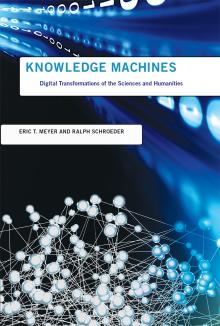In April 2015, MIT Press published Ohio University alum Eric T. Meyer’s book Knowledge Machines: Digital Transformations of the Sciences and Humanities (with co-author Ralph Schroeder, also of Oxford).
Meyer is Director of Graduate Studies and Associate Professor at the Oxford Internet Institute, University of Oxford, where he has been on the faculty for the past nine years. He earned a B.A. in Anthropology 1988 from the College of Arts & Sciences at Ohio University.
Meyer is married to Michelle Osborne ’88, an Honors Tutorial College graduate who majored in telecommunications and political science. She is currently working on an oral history project with a 100-year-old former school teacher who has lived in Oxford her whole life.
Researching How People and Technologies Interact
“I really enjoy branching out into new areas as opportunities for new research projects emerge, allowing me to do research on topics as varied as the digital lives of whale scientists, genetics researchers, librarians and library users, theatres and artists, medical doctors, and a range of others,” said Meyer.
 “Because I am in a multidisciplinary department that is researching how people and technologies interact, there are always interesting new topics emerging.
“Because I am in a multidisciplinary department that is researching how people and technologies interact, there are always interesting new topics emerging.
“This variety is also reflected in our students, who do such an amazingly wide range of projects for their dissertations and theses that I am always learning exciting new things about the digital world in the course of supervising students.”
About Knowledge Machines: Digital Transformations of the Sciences and Humanities: In Knowledge Machines, Meyer and Schroeder argue that digital technologies have fundamentally changed research practices in the sciences, social sciences, and humanities. They show that digital tools and data, used collectively and in distributed mode—which they term e-research—have transformed not just the consumption of knowledge but also the production of knowledge. Digital technologies for research are reshaping how knowledge advances in disciplines that range from physics to literary analysis.
Meyer and Schroeder map the rise of digital research and offer case studies from many fields, including biomedicine, social science uses of the Web, astronomy, and large-scale textual analysis in the humanities. They consider such topics as the challenges of sharing research data and of big data approaches, disciplinary differences and new forms of interdisciplinary collaboration, the shifting boundaries between researchers and their publics, and the ways that digital tools promote openness in science.
This book considers the transformations of research from a number of perspectives, drawing especially on the sociology of science and technology and social informatics. It shows that the use of digital tools and data is not just a technical issue; it affects research practices, collaboration models, publishing choices, and even the kinds of research and research questions scholars choose to pursue. Knowledge Machines examines the nature and implications of these transformations for scholarly research.



















Comments